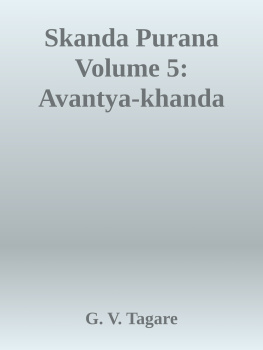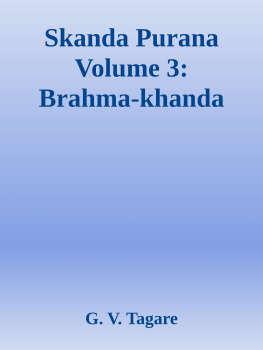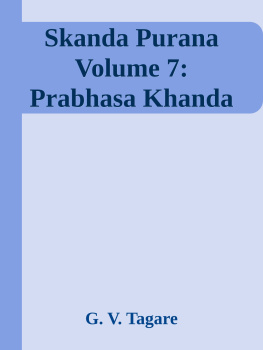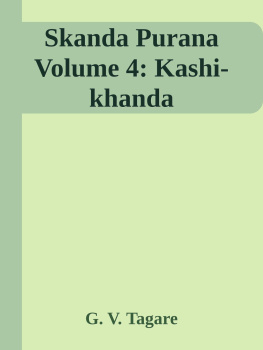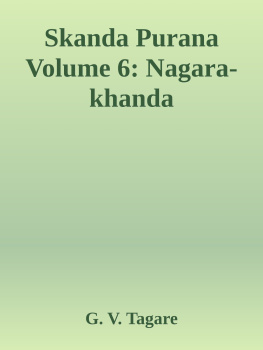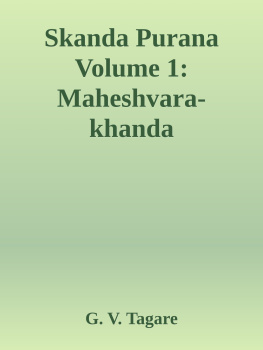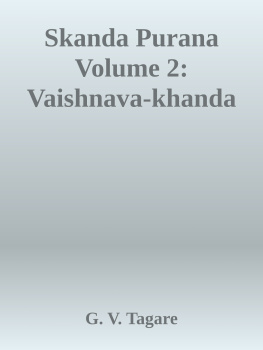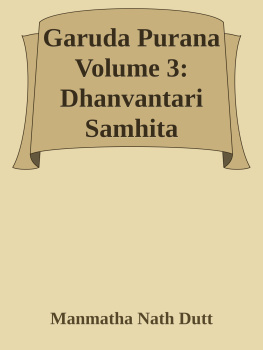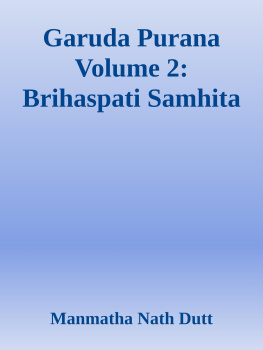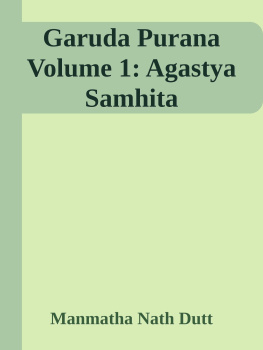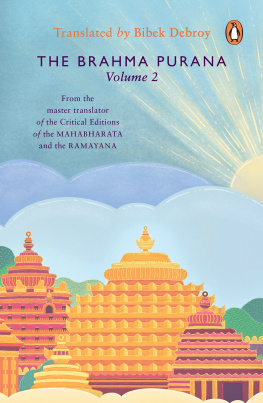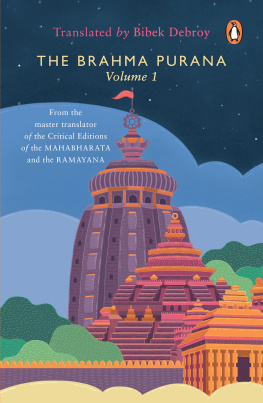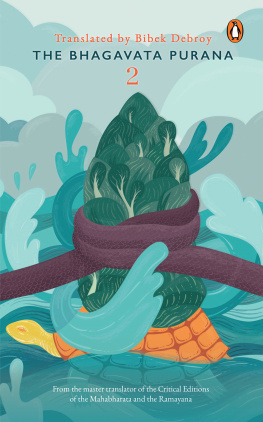G. V. Tagare - Skanda Purana Volume 5: Avantya-khanda
Here you can read online G. V. Tagare - Skanda Purana Volume 5: Avantya-khanda full text of the book (entire story) in english for free. Download pdf and epub, get meaning, cover and reviews about this ebook. genre: Religion. Description of the work, (preface) as well as reviews are available. Best literature library LitArk.com created for fans of good reading and offers a wide selection of genres:
Romance novel
Science fiction
Adventure
Detective
Science
History
Home and family
Prose
Art
Politics
Computer
Non-fiction
Religion
Business
Children
Humor
Choose a favorite category and find really read worthwhile books. Enjoy immersion in the world of imagination, feel the emotions of the characters or learn something new for yourself, make an fascinating discovery.
- Book:Skanda Purana Volume 5: Avantya-khanda
- Author:
- Genre:
- Rating:4 / 5
- Favourites:Add to favourites
- Your mark:
- 80
- 1
- 2
- 3
- 4
- 5
Skanda Purana Volume 5: Avantya-khanda: summary, description and annotation
We offer to read an annotation, description, summary or preface (depends on what the author of the book "Skanda Purana Volume 5: Avantya-khanda" wrote himself). If you haven't found the necessary information about the book — write in the comments, we will try to find it.
Skanda Purana Volume 5: Avantya-khanda — read online for free the complete book (whole text) full work
Below is the text of the book, divided by pages. System saving the place of the last page read, allows you to conveniently read the book "Skanda Purana Volume 5: Avantya-khanda" online for free, without having to search again every time where you left off. Put a bookmark, and you can go to the page where you finished reading at any time.
Font size:
Interval:
Bookmark:
This page describes Avantikshetra-mahatmya which is section 1 of the English translation of the Skanda Purana, the largest of the eighteen Mahapuranas, preserving the ancient Indian society and Hindu traditions in an encyclopedic format, detailling on topics such as dharma (virtous lifestyle), cosmogony (creation of the universe), mythology (itihasa), genealogy (vamsha) etc.
The Avantketramhtmya ( region.
This page describes The Greatness of Mahakalavana which is chapter 1 of the English translation of the Skanda Purana, the largest of the eighteen Mahapuranas, preserving the ancient Indian society and Hindu traditions in an encyclopedic format, detailling on topics such as dharma (virtous lifestyle), cosmogony (creation of the universe), mythology (itihasa), genealogy (vamsha) etc. This is the first chapter of the Avantikshetra-mahatmya of the Avantya-khanda of the Skanda Purana.
[]
Obeisance to r .
1. May that first Lord of all the worlds named r are creators of the subjects, they make obeisance to him due to their great fear of repeated births in the world. He, the Lord, has permeated the unmanifest cavity of the minds of those who are engaged in meditation with excellent concentration.
2. May all the on the earth and the meritorious holy rivers be carefully described, so that faith in them may be engendered.
3. There is the river . It is also served by sages.
4-8. , O goddess.
It is here that r Mahkla who is like fire unto the faggots of sins, is stationed. The holy spot extends over a -slaughter etc.
It accords worldly pleasures and salvation. It is a holy spot that destroys the sins of the (the ultimate annihilation of the world). It is difficult of attainment even by Devas.
9-10. O Lord, let the efficacy of this holy place be narrated. O that are to be found there. I am extremely eager to hear.
11-16. Listen attentively, O goddess, to the sin-destroying power of the holy spot. O great goddess, it is the primordial holy place that destroys all sins. In its vicinity is the peak of groups playing on their lutes (and musical instruments).
17. In that exquisitely charming forest is the mansion of and all the landings and storeys thereof are highly splendid.
18-21. The celestial court of assembly that accords great delight to the Devas is also there. It is called trees. The loud reports of many musical instruments echo and reecho there with pleasing tempos and time measures of the songs. Millions of pillars are erected there with bright mirrors heightening its splendour. Many things that capture the fancy of the onlookers abound there. The dances of celestial damsels with graceful, seductive footsteps increase its glory.
22. It is completely covered with the (settlements of) groups of seers (is) and is resorted to by hosts of sages ( giving delight to all.
23-26a. The Brhmaa-sage ) bowed down to him duly and stood there with palms joined in reverence. His face was beaming with pleasure and the hairs stood on end all over the body. With great pleasure, he asked the sage about the greatness of Mahkla, that destroys the delusion of living beings.
26b-29. Why is this sacred place that is the most excellent of all, called Mahklavana? O holy Sir, may the power and greatness of the holy spot be narrated. How did it come to be known as Guyavana (Secret Forest)? How does it have the status of a (cremation ground) mentioned as a holy spot? This is asked by me out of my devotion to akara. You are an expert in the scriptural texts; do tell me.
[Note: In vv 30-34, Sanatkumra explains how the terms . The scale of efficaciousness of these holy places in vv 38-42 is to show the holiest character of Mahklavana.]
30-34. This spot where sins are destroyed is called Ketra (holy spot of pilgrimage). Since this is the abode of the Mothers ( etc.), it is called Pha.
People who die (here) are not reborn. Hence it is called ara (arid land). This place is called Guhya because it is always a favourite resort of the noble-souled (goblins) it is called mana.
The following holy spots are called Divyamana. (divine cremation ground): Mahklavana, Avimuktaka, . They are always dear to Rudra.
35-36. The holy Lord sports about in all these always.
Naimia is a great holy is considered ten times more meritorious than Kuruketra.
37. O Vysa, the excellent Mahklavana is ten times more efficacious (in giving merits) than it, as well as all holy places all over the earth such as Prabhsa etc.
38-42. (Out of all holy places) Prabhsa is the first and foremost holy spot of the . But, O sage, Mahklavana is very famous and reputed in all respects. Except in the case of Mahklavana, all these five epithetsmana, ara, Ketra, Pha and Vana, are not applicable together to a single holy spot.
:
Kyvarohaa: Modern Karvn in Baroda District of Gujarat. It is the birth place of Nakula (2nd cent. C.E.), the 28th incarnation of iva. He is a historical founder of Pupatism.
This page describes The Decapitation of Brahma which is chapter 2 of the English translation of the Skanda Purana, the largest of the eighteen Mahapuranas, preserving the ancient Indian society and Hindu traditions in an encyclopedic format, detailling on topics such as dharma (virtous lifestyle), cosmogony (creation of the universe), mythology (itihasa), genealogy (vamsha) etc. This is the second chapter of the Avantikshetra-mahatmya of the Avantya-khanda of the Skanda Purana.
[]
Note: This is the (vv 18-26, 28-29).
1-4. Formerly, when all mobile and immobile beings had perished and there remained only one vast expanse of ocean, there was neither fire nor the sun, neither the earth nor the sky or quarters. There were no stars, no luminary, no firmament, neither the moon nor the planets, neither alone stood by for the purpose of blessing the worlds. The Lord stood there observing all the regions in the various quarters.
5. For the sake of creation, he stirred round, , Kma who was not much emaciated.
6. The embryo became a bubble and developed rapidly. It became an egg of gold, fully round and very strong, massive.
7. Struck by the hand, it became a great thing with two fragments. The lower fragment is known as the earth and the upper one the firmament studded with stars.
8. Then Brahm, with five faces and four arms, manifested in the middle. Thereafter conccedingly[?] directed him:
9. By my blessings, O mighty-armed one, start the creation of the universe of diverse kinds. After saying this, the Lord vanished somewhere. But Brahm did not go.
10-11. Brahm who was being urged to create, thought of the Lord. Being meditated upon by Brahm for getting the requisite knowledge, Lord . Even after acquiring the Vedas, he was not competent to create for a long time.
12. To propitiate Bhava, he began his penance once more. When he did not visualize the Lord, he contemplated on the Lord and eulogized him with devotion.
13. Obeisance to iva whose mind is of and whose radiance spreads around; who is the redeemer of the the Vedas with the six Agas; who is my creator as well as that of the Vedas with six Agas; who is the eye (of the world) and whose greatest form can be experienced.
Font size:
Interval:
Bookmark:
Similar books «Skanda Purana Volume 5: Avantya-khanda»
Look at similar books to Skanda Purana Volume 5: Avantya-khanda. We have selected literature similar in name and meaning in the hope of providing readers with more options to find new, interesting, not yet read works.
Discussion, reviews of the book Skanda Purana Volume 5: Avantya-khanda and just readers' own opinions. Leave your comments, write what you think about the work, its meaning or the main characters. Specify what exactly you liked and what you didn't like, and why you think so.

